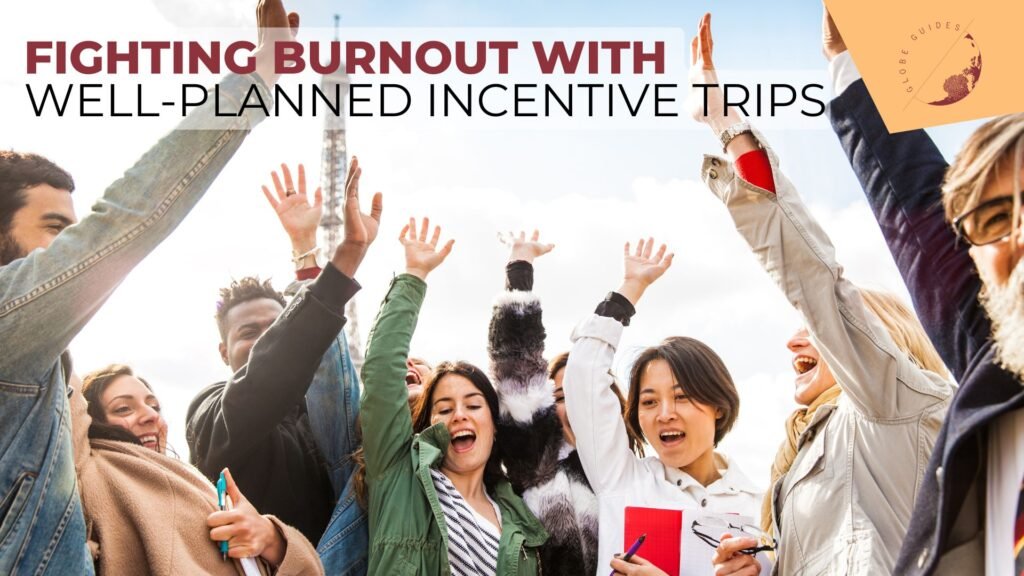Incentive trips are a powerful tool that organizations use to recognize their team’s efforts. According to the Incentive Federation’s survey, organizations offering incentive travel programs saw a 27% increase in sales. This strategy goes beyond conventional rewards and taps into the deeper needs of employees, unlocking their true potential and combating the ever-present threat of burnout.
It is a strategy that goes beyond conventional rewards and taps into the deeper needs of your employees. In an environment where stress and overwork are constant companions, incentive trips might be exactly what your organization needs to rejuvenate its workforce. Discover how a well-tailored incentive trip can transform your team and bring lasting benefits.
Understanding Burnout and Its Impacts
Sometimes, companies cannot reduce the workload, especially during periods of growth, which is a positive sign of success. However, this increased demand can lead to an unsustainable overload if not managed properly, resulting in inefficient use of time and resources. When employees are consistently overworked, they may find it challenging to maintain productivity and quality, as the constant pressure to perform can lead to errors, missed deadlines, and reduced creativity.
If left unchecked, this overload can cause physical and mental exhaustion among team members, ultimately leading to burnout. Burnout is characterized by feelings of energy depletion, increased mental distance from one’s job, and reduced professional efficacy. This not only affects the individuals but also leads to a decline in overall team performance and morale.
The Limitations of Monetary Incentives in Combating Burnout
While monetary incentives may boost job satisfaction, they often fall short in addressing burnout’s deeper issues. Employees experiencing burnout symptoms may face absenteeism, turnover, and severe health problems. Hedonic adaptation causes the temporary morale boost from monetary bonuses to diminish over time.
The Temporary Nature of Financial Rewards
Financial incentives become less motivating as employees get used to them, leading to increased expectations and higher turnover rates. This temporary nature makes them an inadequate long-term strategy for preventing burnout.
Lack of Comprehensive Support
Many employees fail to take proactive steps for their well-being. Financial rewards don’t address this issue, nor do they support overall well-being. Preventing burnout requires strategies that encourage employees to engage in wellness programs, embrace flexible work arrangements, and pursue opportunities for personal growth.
Ignoring the Root Causes of Burnout
Monetary incentives overlook burnout’s root causes like excessive workload and poor work-life balance. Effective strategies must include organizational changes, supportive leadership, and a culture promoting employee well-being.
Boosting Morale and Productivity through Incentive Trips
Incentive trips not only compensate for hard work but also serve as a powerful tool for enhancing team engagement and loyalty. These trips offer employees a chance to step away from their daily routines, relax in new environments, and feel appreciated for their contributions. The sense of being valued can significantly boost morale and motivation, leading to a more cohesive and dedicated team.
Beyond relaxation, incentive trips can effectively combat burnout when combined with personal and professional growth activities. Workshops, team-building exercises, and wellness programs integrated into the trip can help employees develop new skills, improve their well-being, and strengthen team bonds. This holistic approach addresses the root causes of burnout, such as stress and lack of work-life balance, promoting long-term engagement and productivity.
Incentive trips provide an unforgettable experience that leaves a lasting impact on employees. These trips create shared memories and experiences that enhance team camaraderie and foster a positive work culture. By investing in such experiences, organizations can achieve multiple goals: rewarding their team, reducing burnout, and cultivating a loyal, motivated workforce.
How to approach an incentive trip to make it an antidote against Burnout
Incentive trips, when strategically planned, can serve as a powerful antidote to burnout, offering employees a chance to relax, rejuvenate, and re-engage with their work. Here are key strategies to ensure your incentive trip effectively combats burnout and boosts team morale.
Involve Your Team in the Planning Process
By evolving them in the planning process, this approach not only makes the trip more enjoyable for everyone but also fosters a sense of ownership and enthusiasm among the team members. When employees feel their preferences are considered, they are more likely to be engaged and excited about the trip.
Prioritize Wellness Activities
Plan activities that promote both physical and mental well-being. These can include yoga classes, meditation sessions, hiking, or other outdoor activities that encourage relaxation and stress relief. Wellness workshops focusing on mindfulness, nutrition, and stress management can also be valuable. By integrating wellness into the itinerary, you address the root causes of burnout and provide employees with tools to maintain their well-being even after returning to work.
Balance Work and Leisure
A well-balanced itinerary is essential to ensure the trip is both productive and relaxing. Start by scheduling structured activities like team-building exercises, workshops, or strategy sessions in the morning when energy levels are high. Follow these with relaxation activities such as spa treatments, nature walks, or yoga sessions in the afternoon. This balance allows employees to engage in meaningful work-related discussions while also having ample time to unwind and recharge.
Ensure Continuous Support Post-Trip
Plan follow-up activities and resources to help employees integrate what they learned during the trip into their daily lives. Post-trip support reinforces the benefits of the trip and helps maintain the positive momentum:
- Recognize and reward: Continue recognizing and rewarding employees for their hard work. This doesn’t always have to be in the form of trips; small gestures like public acknowledgment, gift cards, or extra time off can go a long way in keeping morale high.
- Healthy Work Culture: Cultivate a supportive and positive work culture where employees feel valued and respected. Encourage open communication, teamwork, and a sense of community within the workplace.
- Balanced Work Distribution: Ensure that workloads are manageable and evenly distributed among team members. Regularly review and adjust assignments to prevent overburdening employees.
- Encourage Breaks and Downtime: Promote the importance of taking regular breaks during work hours. Short breaks can help employees recharge and stay productive throughout the day.
- Foster employee feedback: Create channels for employees to provide feedback on their work environment and any challenges they face. Actively listening and addressing their concerns can improve overall satisfaction and prevent burnout.
Let Globe Guides tailor your incentive trip into a powerful antidote to burnout, fostering a rejuvenated and motivated workforce. Our expertise in crafting bespoke travel itineraries will help you plan a seamless and impactful retreat that meets your team’s specific needs.






